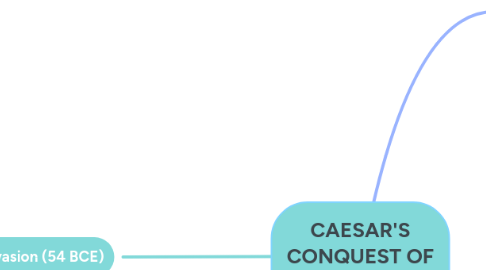
1. Significance
1.1. Political impact
1.1.1. Caesar's expeditions to Britain increased his prestige in Rome and demonstrated the reach of Roman power.
1.2. Long-term impact
1.2.1. These invasions paved the way for the later, more sustained Roman conquest of Britain under Emperor Claudius in 43 CE.
2. First invasion (55 BCE)
2.1. Ceasar wanted to stop the Britons from supporting the Gallic tribes in their resistance against Rome.
2.1.1. He found a lot of different tribes in Britain. He wanted to gain client leaders, get to new territories to start paying taxes and encourage trade.
2.2. PURPOSE
2.2.1. Caesar aimed to punish the Britons for aiding the Gauls and to explore the island's potential for future conquests.
2.3. PREPARATION
2.3.1. Caesar assembled a fleet and an army, setting sail from the coast of Gaul (modern-day France).
2.4. LANDING
2.4.1. The initial landing was met with resistance from the Britons. He landed on the southeastern coast.
2.5. ENGAGEMENTS
2.5.1. The Roman troops faced challenges, including unfavourable weather and fierce opposition.
2.6. OUTCOME
2.6.1. Due to the late season and logistical issues, Caesar decided to withdraw back to Gaul without significant territorial gains.
3. Caesar's invasions laid the groundwork for the eventual Roman conquest of Britain under Emperor Claudius nearly a century later.
3.1. Caesar's ventures increased Roman knowledge of Britain and its tribes, setting the stage for further integration into the Roman Empire.
4. Second invasion (54 BCE)
4.1. Learning from the previous year, Caesar returned with a much longer force, including five legions and a significant cavalry contingent.
4.2. PURPOSE
4.2.1. Reinforcing the Roman power and control after the first expedition's limited success.
4.3. LANDING AND ADVANCE
4.3.1. This time, the Romans faced less resistance during the landing and managed to advance inland.
4.4. CAMPAIGN
4.4.1. Caesar employed a combination of direct military action and alliances with rival British tribes.
4.5. OUTCOME
4.5.1. Caesar established temporary Roman dominance, receiving hostages and tribute from various tribes.
4.6. WITHDRAWAL
4.6.1. Despite these successes, the ongoing resistance compelled Caesar to withdraw once more.
